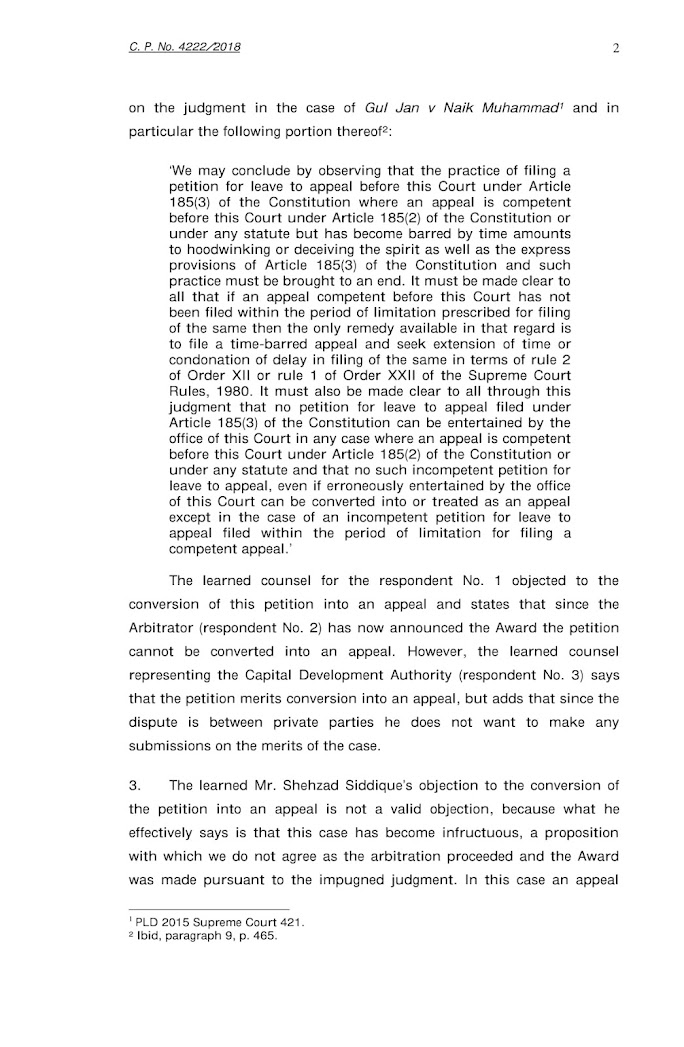The exercise of revisional powers is circumscribed by section 115 of the Code. Clauses (a) and (b) are attracted when jurisdiction, which is vested in a court, is not exercised or when jurisdiction is not vested in a court yet the court assumes jurisdiction. And, clause (c) is with regard to a court exercising jurisdiction illegally or with material irregularity. Conversely, when the order of a subordinate court is within its jurisdiction and such court has not exercised jurisdiction illegally or with material irregularity revisional jurisdiction cannot be exercised.The power of revision cannot be used by a higher court to substitute its own discretion or authority. A revision also does not lie when the law provides for an appeal. And this Court has held5 that, ‘The words “no appeal lies thereto” are words of general input and there is nothing in the section to confine their operation only to first appeals.’ However, it does not follow that whenever an appeal is not provided for a revision would lie. A revision can only be filed if the order/judgment which has been impugned comes within clauses (a), (b) and/or (c) of subsection (1) of section 115 of the Code. The Privy Council explained when section 115 would apply and when it would not:
The exercise of revisional powers is circumscribed by section 115 of the Code. Clauses (a) and (b) are attracted when jurisdiction, which is ..................
Case Laws
March 10, 2022
Under the Arbitration Act arbitration may be initiated without intervention of a court (Chapter II) or with intervention of a court (Chapter III) or recourse may be had to arbitration in suits (Chapter IV). Section 20(1) of the Arbitration Act states that, ‘where any persons have entered into an arbitration agreement before the institution of any suit with respect to the subject-matter of the agreement or any part of it…’
Civil Petition No. 4222/2018
Blog Archive
Case Law Search
About Me
About
Subscribe Us
Ad Space
Popular Posts

مسلم قانون کے تحت تحائف کو کنٹرول کرنے والا قانونی فریم ورک ۔
January 17, 2026
Labels
Tags
- 0. XXII
- 0.XXXIII
- 11 CPC
- 115 CPC
- 144 CPC
- 148 CPC
- 149 CPC
- 151 CPC
- 1877 (I of 1877)
- 1908
- 1910
- 1962
- 1967(XVII of 1967)
- 2012 (IV of 2012)
- 2014 (XX of 2014
- 21 CPC
- 23 CPC
- 24 CPC
- 36 CPC
- 39 CPC
- 42 CPC
- 5 CPC
- 52 CPC
- 67 CPC
- 77 CPC
- 87 QSO
- 9 CPC
- Amendment
- APPEALS REVISION
- Banking Companies Ordinance
- C.P.C.
- Cas
- Case Law with Complete Judgment
- Case Laws
- Civil Procedure Code (V of 1908)
- CONVERSION OF WTITS
- CPC
- CPC 88
- Defamation Ordinance (LVI of 2002)
- Document
- Draft/Application
- Duty of Court
- Electricity Act
- Fraud
- Gift
- Important Judgment
- Inherit
- Inheritance
- Islamic Law
- Limitation Act
- limitation Laws Art. 163
- Must read judgement
- New ORDINANCE
- O-1 R-10
- O. XXI
- O. XXXIII
- O.1X
- O.IX
- O.IX R.13
- O.V
- O.VII
- O.VII R.11
- O.XI Rr.14 & 16
- O.XI Rr.14 & 21
- O.XL R. 1
- O.XX R.4
- O.XXXIV .R.5
- O.XXXIX
- Oder VII Rule 11d
- Oral Gift
- ORDER 37 – RULE 1&2
- Order 9 Rule 4
- Order XXV Rule 1
- Order-14
- Order-21
- Order-39
- Order. VII Rule.11
- PLD 2021 BALOCHISTAN 172
- Pleadings
- Pre-emption Act (1 of 1913)
- Punjab Overseas Commission Act
- Punjab Partition of Immovable Property Act
- QSO 79
- R . 11
- R 0. XXXIX
- R-4-A
- R. 10
- R. 8
- R.11
- R.13
- R.5
- R.6
- Rent
- Rent premises Act 2009
- Rr. 1 & 2
- Rr. 1 &2
- Rr. 15
- Rr. 5
- Rr. 7
- Rr. 97 to 103
- Rule 10
- Rule-1 & 2
- Rule-11
- Rule-2.
- Rules. 6 & 13
- SECOND APPEAL INTO REVISION
- SECTION 115
- SECTION 115.
- SECTION 12(2)
- SECTION 144 CPC
- Section 15
- SECTION 151
- SECTION 151.
- Section 17
- Section 18
- SECTION 9; O-7 R-11; BANKING ORDINANCE 1979 Sec 6(1) & (4)
- Section. 27
- SECTIONS 35 & 35-A C.P.C.
- Sind Rented Premises Ordinance (XVII of 1979)
- Sindh Rented Premises Ordinance (XVII of 1979)
- Specific Relief Act
- Specific Relief Act (I of 1877)
- Ss. 39 & 52.
- Suit
- Talk of the town
- Topic
- Transfer of Property Act (IV of 1882)
- Video
- VII
- W.P. Land Revenue Act
- West Pakistan Family Courts Act (XXXV of 1964)
- West Pakistan Land Revenue Act (XVII of 1967)
- West PakistanLand Revenue Act (XVII of 1967)
- West Punjab Muslim Personal Law (Shariat) Application Act (IX of 1948)
Popular Posts

مسلم قانون کے تحت تحائف کو کنٹرول کرنے والا قانونی فریم ورک ۔
January 17, 2026
Labels
Menu Footer Widget
Created By Blogger Template | Distributed By Gooyaabi Template











0 Comments